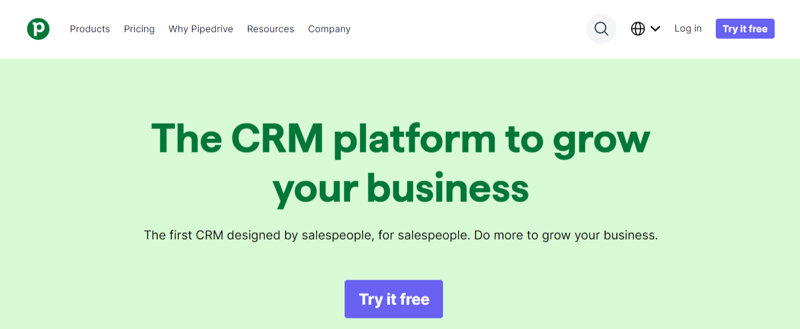
4 Tested & Proven Insider Tips on Nailing Your Sales Call
 Updated on
Updated on
By Ringy
Table of Contents
Table of Contents
Sales calls are a weird little phenomenon.
For beginner and experienced sales reps alike, sales calls can be a source of anxiety and fear, as well as one of great relief, excitement, encouragement, and whatever you call that on-top-of-the-world-fizzing feeling you get when you close a big deal.
Perhaps the emotion you'll feel most often, however, is confusion.
What exactly should I be saying here? Am I putting my point across concisely? Should I be closing more than this?
These are questions all newbie sales reps face. That is until they learn exactly how to approach making a sales call.
In this guide, we're going to:
- Cover the 5 main kinds of sales calls
- Give you 6 types for making strong sales calls
- Discuss how sales CRMs can really level up your ability to access results from sales calls
Sounds good?
Thought so. Let's get started.
Criteria in Choosing a Sales CRM
There are a number of things to consider when choosing a sales CRM. These are the 6 most important considerations.
- Automation - What does the CRM platform allow you to automate (there are often limitations on this)?
- Pricing model - What does the platform cost? Is it a one-off fee or monthly? Is there a cost per user? What about charges for emails, SMS messages, and call minutes?
- Reporting - How robust is the platform's reporting system? Consider the types of activities and results you'd like to report on - is this possible? Can you build a custom dashboard?
- Pipeline management - Pipeline management is crucial for high-volume sales teams. Most CRMs are built for this, but some will limit the number of pipelines you can operate, so check for this.
- Integrations - A sales CRM is unlikely to be the only tool in your tech stack. Make sure the platform you choose has a wide variety of integrations, especially with those tools you're already using (like Gmail, for example.)
- Communications methods - Does the platform allow you to make calls or emails within the interface? What about SMS messaging, or social media interactions?
Top 5 Sales CRM
Ringy

Oh hey, that's us!
Ringy is a powerful sales CRM platform designed to help reps do what they do best:
Sell.
In particular, Ringy is focused on sales communications, powering up your ability to:
- Make sales calls
- Punch out emails
- Send SMS messages
Ringy has a number of cool features for sales reps who are on the phone all day talking to customers.
These include:
- A power dialer to pump up your sales volume
- Local numbers
- Drip campaigns (to send SMS and email on repeat)
- Cloud VOIP softphone
- Mobile app (so you can call and update your CRM on the go)
Pipedrive

Pipedrive is a popular platform that, surprisingly enough, is designed to help sales reps drive their pipelines.
One of Pipedrive's defining features is its huge number of integrations.
The platform integrates with over 250 commonly used platforms, across applications like:
- Marketing automation
- Phone calling
- Lead generation
One thing to note with Pipedrive is that they don't have a native calling functionality. You do have a lot of options for third-party integrations, though, but you'll need to factor that cost in when making your assessment.
Copper

Copper is another popular sales CRM platform that offers a wide variety of features.
Though Copper offers a lot of your standard features (automation, pipeline management, sales call reports etc), what sets it apart from other CRMs is its Google integration.
Basically, the majority of Copper's features are available for use within the Google Workspace platform (most CRMs work the other way around, allowing you to access Google features, like Gmail, within the CRM).
This is a big plus for those who are already deeply embedded in processes using Google Workspace, and don't want yet another tab open.
One thing worth noting about Copper, however, is that it doesn't offer a native SMS capability.
You can plug in external suppliers like Kixie or JustCall, so its not impossible, but you'll need to bear in mind the extra cost, as well as set-up time associated with that whole deal.
ZohoCRM

Zoho is a bit of a software giant.
They have full-scale reporting tools, marketing automation tools, customer support software, and, of course, the ZohoCRM.
The Zoho CRM itself is incredibly complex and has some seriously advanced features, such as:
- Portals and wizards
- Territory management tools
- Voice assistance
- Competitor alerts
- AI predictions
- Project management capabilities
It's also highly customizable, meaning teams can craft a CRM that looks and feels exactly how they'd like it to.
The drawback of all this is that the learning curve for ZohoCRM is pretty steep, meaning it's really going to be best for enterprise-grade companies who are capable of taking advantage of the diverse feature set.
HubSpot CRM

Our last CRM is from HubSpot, the inbound marketing giant.
Like Zoho, HubSpot offers a number of different software platforms, one of which being the HubSpot CRM.
This CRM offers features such as pipeline management, reporting, email and phone call integrations, and communications tracking.
Perhaps one of the biggest benefits of the HubSpot CRM (apart from it having a seriously capable free version), is its integration with the rest of the HubSpot tech stack.
If you're planning on building an inbound sales team and relying on HubSpot's inbound marketing offerings, then this CRM is an obvious choice.
The downside, though, is that things get expensive pretty quickly as you upgrade to deeper feature sets.
See what we mean here:
|
Top 5 Sales CRM |
Pricing |
|
Ringy |
$109 per month |
|
Pipedrive |
$14-99 per user, per month (billed annually) |
|
Copper |
$9-99 per user, per month (billed annually) |
|
ZohoCRM |
$12-45 per user, per month (billed annually) |
|
HubSpot CRM |
$15 per seat/month - $1,170 per month with 5 seats (billed annually) |
*Note: Pricing current as of February 2025*
Types of Sales Calls

Effective sales calls are the lifeblood of many businesses. Understanding the different types of sales calls and how to execute them successfully is crucial for driving revenue and building lasting customer relationships. Let's look at the various forms these calls can take.
1. Cold Calls vs. Warm Calls: What's the Difference?
Cold calls involve reaching out to potential customers who have had no prior interaction with your business. These calls rely on strong sales scripts, persuasive communication, and the ability to handle objections effectively. Since cold calling has an average success rate of 2%, it's crucial to refine your approach to make a strong first impression.
Warm calls, on the other hand, target prospects who have previously engaged with your brand—through website visits, inquiries, or prior conversations. These sales calls tend to have higher conversion rates since the lead is already familiar with your company.
Key Differences:
- Cold calls: Unsolicited, low conversion rates, require strong objection-handling skills.
- Warm calls: Pre-engaged leads, higher chance of conversion, often based on prior interest.
2. Follow-Up Calls and Re-Engagement Calls
A follow-up sales call is essential for keeping prospects engaged. Studies show that 80% of sales require at least five follow-ups, yet many reps give up after just one or two attempts. These calls aim to nurture leads, answer additional questions, and move the prospect closer to a decision.
Re-engagement calls, on the other hand, target leads who have gone cold. These could be past customers, inactive trial users, or prospects who previously showed interest but didn't convert.
Personalization is key in re-engagement calls, as reminding prospects of their past interest and addressing their concerns can reignite their motivation to buy.
3. Closing Calls: Turning Prospects into Customers
Closing calls are where all prior efforts pay off. These sales calls focus on sealing the deal and converting a prospect into a paying customer. The success of a closing call depends on active listening, addressing any final objections, and clearly outlining the next steps.
Best practices for successful closing calls:
- Summarize previous discussions and reiterate value propositions.
- Use trial closes to gauge the prospect's readiness.
- Overcome last-minute objections with confidence.
- Provide a clear, actionable next step (contract signing, payment details, onboarding).
4. Sales Call Database: How Keeping Track of Call Sales Data Improves Strategy
A sales calls database is a game-changer for optimizing sales performance. Tracking call details, outcomes, objections faced, and customer responses helps sales teams refine their approach and identify patterns.
Benefits of maintaining a sales call database:
- Data-driven decisions: Understand which types of sales calls yield the best results.
- Improved objection handling: Spot recurring objections and prepare effective responses.
- Better follow-ups: Keep track of past conversations to personalize future interactions.
- Increased conversions: Sales reps can analyze successful call strategies and replicate them.
Using a CRM with built-in sales call reports, like Ringy, can make this process even more efficient, allowing teams to monitor performance and adjust their strategies in real-time.
Insider Tips On How To Make Successful Sales Calls

A successful sales call isn't about following a script word for word—it's about understanding your prospect, handling objections with confidence, and guiding the conversation toward a conversion. Whether you're cold calling or following up, these insider tips will help you refine your approach and improve your results.
1. Preparing for a Sales Call: Research and Scripting
Preparation is the foundation of every effective sales call. Walking into a conversation without research is like going to battle without a plan—you're setting yourself up for failure.
Here's how to prepare for a sales call:
- Research your prospect: Check their industry, role, company pain points, and any previous interactions they've had with your business.
- Set a clear objective: Know what you want to achieve—whether it's booking a demo, closing a deal, or gathering information.
- Use a flexible script: Scripts should serve as a guide, not a crutch. Write key talking points, but keep it conversational to avoid sounding robotic.
- Anticipate objections: Identify common concerns your prospects might raise and prepare strong responses.
2. How to Handle Objections in Sales Calls Effectively
Objections are inevitable in sales calls. However, they're not deal-breakers—they're opportunities to clarify doubts and move the conversation forward. The key is to stay calm, listen actively, and address concerns with confidence.
The following are common sales call objections and how to handle them:
- "I don't have the budget." → Highlight ROI and flexible payment options.
- "I'm not interested." → Ask open-ended questions to uncover the real reason for hesitation.
- "I need to think about it." → Offer additional insights or a follow-up call to keep the conversation going.
Use the Acknowledge, Ask, Address method:
- Acknowledge the concern ("I understand budget is a big factor.").
- Ask clarifying questions ("What's your top priority when evaluating solutions?").
- Address it with relevant data, testimonials, or an alternative solution.
3. The Importance of Active Listening and Asking the Right Questions
Sales calls should never feel one-sided. Talking too much and not listening enough can push prospects away. Active listening allows you to understand their real needs and tailor your pitch accordingly.
Here's how to practice active listening in sales calls:
- Focus on what the prospect is saying instead of thinking about your next response.
- Repeat or paraphrase their concerns to show understanding ("So what you're saying is…").
- Take notes to track key pain points and objections.
Ask open-ended questions to keep the conversation flowing:
- "What challenges are you currently facing with [problem your product solves]?"
- "What's the most important factor in your decision-making process?"
- "What would the ideal solution look like for you?"
4. Techniques for Improving Sales Call Reports and Tracking Performance
Tracking and analyzing sales call data is crucial for refining your approach. A sales call report provides insights into what's working and what needs improvement.
This is how you can enhance your sales call reports:
- Record key details: Document call duration, prospect responses, objections raised, and next steps.
- Analyze trends: Identify which objections come up most often and which sales techniques lead to the highest conversions.
- Use CRM tools: A sales call database streamlines performance tracking and helps sales teams stay organized.
- Set benchmarks: Compare individual performance against team goals to identify strengths and areas for improvement.
By consistently reviewing sales call reports, sales reps can fine-tune their approach, improve call quality, and increase close rates.
Why You Need a Sales CRM for Better Sales Calls

There are many behaviors we can use to improve our sales calls.
But we also see some significant improvements in our ability to sell by working on our sales tech stack.
At the center of this sales stack should be your CRM (like your sales calls database), which offers a number of important benefits to sales reps.
Here are just a few examples:
|
Benefits of using Sales CRM |
Why |
|
Centralized sales calls database |
A well-tuned sales CRM means none of your customers (whether potential or actual) get lost in the mix. You can schedule activities to complete in the future, or even have your CRM automate communications. |
|
Constant contact with your customers |
Without a CRM, your data is spread everywhere. With one, you have a single point of truth, with records of all customer interactions. No more hunting for that damn phone number. |
|
Sales call reports |
Most capable sales CRMs have pretty advanced reporting and analytics suites. Reps and managers can use this feature to determine the effectiveness of certain sales activities, to A/B test, and to measure progress toward monthly quotas. |
|
Power dialers save you a tonne of time calling up prospects who don't answer, allowing you to focus on the activities that actually move the needle. |
|
|
More consistency around communications |
Because CRMs allow you to store pre-made emails and SMS messages, sales managers can ensure consistency of messaging across a team of reps. This feature also aids in the ability to A/B test messaging. |
|
Local Calling ID |
Local Calling ID is a feature some CRMs offer that makes it appear to your prospect that you are dialling from a number local to them. This is proven to result in stronger answer rates. |
|
Practicality through automation |
Many CRMs offer a degree of automation, meaning you can set rules in your software to perform specific activities based on triggers. Many sales reps use this to automate follow-up emails and SMS messages, as well as to schedule future activities such as sales calls. |
Not already using a sales CRM? Then it's probably about time you got yourself geared up, especially if you want to really maximize your ability to make a killer sales call.
Conclusion
Sales calls can be intimidating, but they can also be extremely rewarding.
Mastering sales calls requires preparation, active listening, and a strategic approach to handling objections. Whether you're making cold calls, following up with prospects, or closing deals, refining your techniques can significantly improve your success rate.
Tracking performance through a sales call database and analyzing sales call reports ensures continuous improvement and higher conversions.
If you're looking for a smarter way to manage your sales calls and streamline your outreach efforts, Ringy CRM has the tools you need. From automated follow-ups to real-time sales call tracking, Ringy helps you stay organized and close more deals efficiently.
Request a demo today and see how Ringy can transform your sales process!

Skyrocket your sales with the CRM that does it all.
Calling? Check. SMS? Check. Automation and AI? Check. Effortlessly keep in touch with your customers and boost your revenue without limits.

Take your sales to new heights with Ringy.
Sales in a slump? Ringy gives you the tools and flexibility you need to capture leads, engage with them, and turn them into customers.
Subscribe to Our Blog
Enter your email to get the latest updates sent straight to your inbox!
Categories
Related Articles



































































































